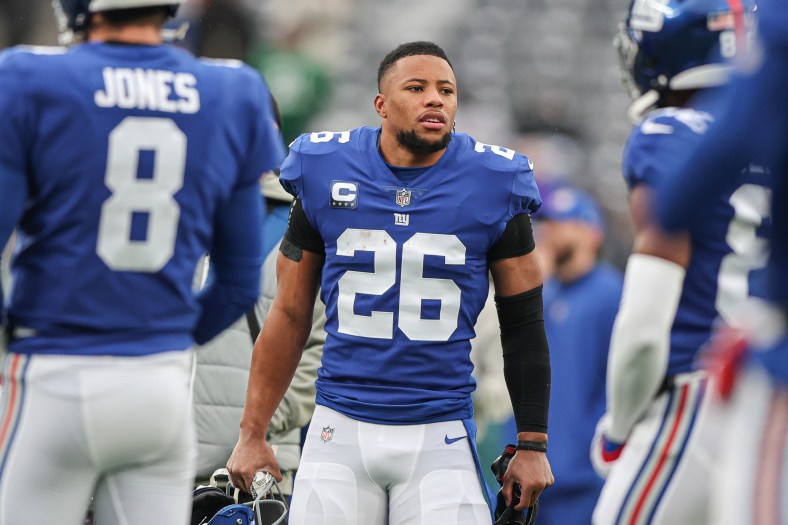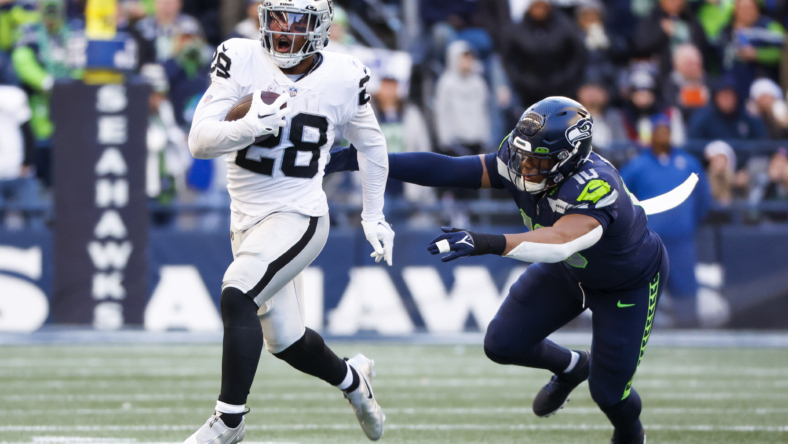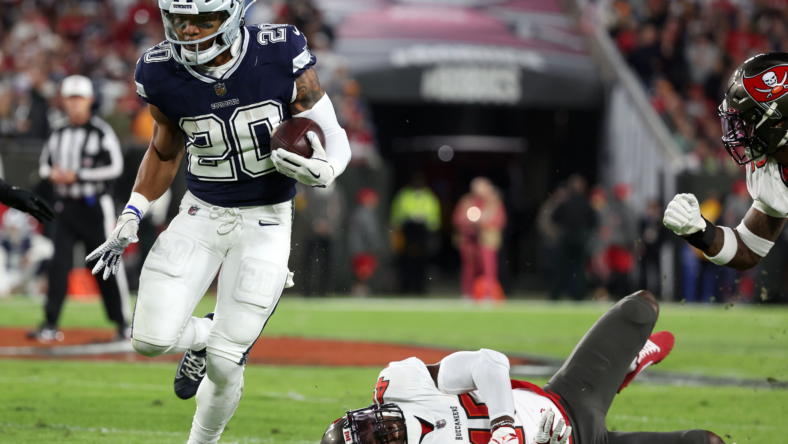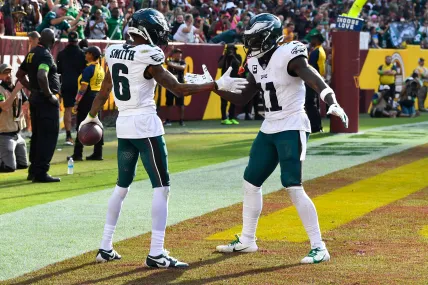
Saquon Barkley didn’t want to be the face of running back strife.
So he passed on an opportunity to be the face of change regarding NFL running backs and their salaries.
Realistically, few, if any, believed NFL owners would start paying running backs premium salaries as they did just a few years ago.
Still, Barkley seemed like he was the one player who could do something to start the conversation. After all, he hadn’t signed the franchise tag, so he didn’t have a contract and wouldn’t be fined $50,000 for every day he didn’t report.
Again, no one thought he’d miss all of training camp or even the opener against Dallas, but the more practice time he missed, in training camp, the more the topic would be discussed in New York and around the NFL.
Head coaches and high-profile quarterbacks around the league would be asked their opinions.
Instead, Barkley took the Giants’ offer to pay $2 million of his $10 million upfront and $1 million in incentives if he had the finest year of his career.
He did it less than 48 hours after many of the league’s top running backs conducted a Zoom call to discuss their options for earning bigger paydays.
Will Josh Jacobs change the game after Saquon Barkley signing?

Perhaps, Josh Jacobs will assume the role of the face of change now that Barkley has agreed to a one-year deal worth as much as $11 million.
Jacobs led the NFL with 1,653 yards. He averaged 4.9 yards per carry and scored 12 touchdowns.
He skipped the opening of training camp with the Las Vegas Raiders.
“I respect (Jacobs’) decision to ultimately not sign a deal at that point,” Raiders coach Josh McDaniels told reporters. “There hasn’t been much since the deadline, and certain things can change, we know that, but that’s a lot of his decision, and I respect whatever he chooses to do.
“That’s his choice, and so I look forward to seeing him when we do.”
The biggest issue for running backs is supply and demand, which is hard to overcome. Running backs get squeezed when it comes to money because they’re easily replaceable; quarterback cash in because there are so few good ones.
That’s why Giants’ quarterback Daniel Jones, who threw 15 touchdowns and five interceptions last season, signed a four-year, $140-million deal with a $36 million signing bonus.
Just so you know, in the 37 games Jones has played with Barkley, he has 46 touchdown passes and 18 interceptions. In the 19 games without him, he has 16 touchdown passes and 17 interceptions.
Everyone knows Barkley is the epicenter of the Giants’ offensive attack, but the game has changed. Quarterbacks get paid, and runners don’t.
The running back wage scale won’t change anytime soon. Only punters and kickers have a lower franchise-tag number than running backs.
The way running backs get paid isn’t changing anytime soon unless someone is willing to be the NFL’s version of Curt Flood, who essentially sacrificed his career to create free agency in major league baseball.
The problem, of course, is the average running back’s career lasts 2.57 years. The league average for players is 3.3 years.
Even the best runners don’t typically play more than seven or eight seasons. They’re not going to sacrifice one of those seasons to change the game for everyone else.
Pittsburgh’s LeVeon Bell skipped the 2018 season after consecutive 1,200-yard seasons with Pittsburgh. He gained 1,218 yards in his last five seasons and never gained more than 789 yards.
Dallas walked away from DeMarco Murray after he gained a franchise-record 1,845 yards in 2016, and let him sign with Philadelphia.
Owners not likely to change the system

The NFL collective bargaining agreement allows teams to hold onto a first-round pick for as long as seven years, if they use the franchise tag twice. They can keep a player for as long as six years, if a player is taken in the second round or later or signs as an undrafted free agent.
By the time running backs reach free agency, they’re near the end of their careers.
Change doesn’t occur without sacrifice. No entity has ever given up power and control without a fight. The owners like the current system, so they have no incentive or desire to change.
Barkley, Jacobs and Dallas’ Tony Pollard each had the franchise tag placed on them in the offseason.
None received long-term deals.
Pollard signed his months ago, but he was a fourth-round pick with $3.6 million in career earnings. The franchise take was more than twice as much as he had earned in his career.
“The system has evolved,” Cowboys owner Jerry Jones said. “The system has gotten more quarterback friendly and less running back friendly relative to the budget you have. That isn’t just the Cowboys, that’s the game today.
“I’ve never met any player — at any level — when it comes to the finances who wasn’t happy, when he looked back that he took the money.”
Jean-Jacques Taylor is an NFL Insider for Sportsnaut and the author of the upcoming book “Coach Prime“, with Deion Sanders. Follow him on Twitter.
